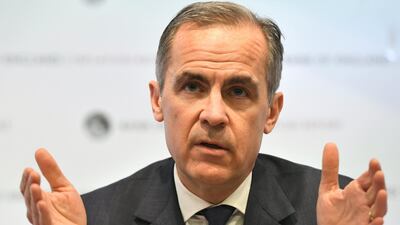The Bank of England signalled the need to raise interest rates earlier and faster than previously indicated, as it raised its forecasts for economic growth.
The central bank's policymakers voted unanimously to leave the benchmark interest rate unchanged at 0.5 per cent at their meeting on Thursday, as they continue to assess how the world's sixth-biggest economy fares amid Brexit uncertainty.But they said if the economy continues along the current trajectory, they would look to raising rates "somewhat earlier and by a somewhat greater degree" than they anticipated at the time of their November report.
The pound surged on the announcement and was up 0.8 per cent to almost $1.4 on Thursday afternoon after declining amid the sell off frenzy of the past week across equity markets around the world. The rout was sparked by the threat of accelerating interest rate hikes in the US and fears of inflation.
"I've been in the camp expecting a May hike for a few months now, and I think today's statement validates that," Alan Clarke, an economist at Scotia Bank, told The National. "But we do remain vulnerable to the data. We need to see if wage growth picked up at the start of 2018 – the key figures for that will be out in March and April – and we also need to keep an eye on GDP figures at the end of April."
Before Thursday’s meeting, investors had been calling for a 50-50 chance of the next rate hike coming in May, when the central bank will next update its economic forecasts. The news is likely to fan market expectations of a move taking place then.
The bank noted that Britain is being boosted by a global economic recovery. Reflecting that, it raised its growth forecasts for the UK economy to 1.8 per cent this year and next, up from its earlier predictions made in November.
_______________
Read more:
City of London is the centre that will hold
'Brexit squeeze' on consumers to continue in 2018
UK growth to remain weak in 2018 as Brexit uncertainty weighs
_______________
"The global economy is growing at its fastest pace in seven years," the BoE said. "The expansion is becoming increasingly broad-based and investment driven. Notwithstanding recent volatility in financial markets, global financial conditions remain supportive.
"UK net trade is benefiting from robust global demand and the past depreciation of sterling," it added.
The British economy has fared much better than many expected after the Brexit vote in June 2016. However, even under the new scenario, growth remains a lot weaker than its pre-financial crisis average of 2.9 per cent.
Policymakers, led by governor Mark Carney, also said that a range of Brexit outcomes are still possible. Those developments "remain the most significant influence on, and source of uncertainty about the economic outlook," they said in their Inflation Report.
The central bank raised the cost of borrowing from 0.25 per cent to 0.5 per cent last November, its first increase in more than a decade, as it sought to get inflation down.
Inflation surged following the EU referendum as the collapse in the pound ramped up the cost of goods imported into Britain.
The UK Consumer Price Index – the key measure of inflation – was 3 per cent in December, above the central bank's 2 per cent target.
At the time of its November meeting, the bank said it expected two hikes of 0.25 per cent over the following three years. However, it now looks as though there could be a third hike, and that those rises might sooner than expected.
Mr Carney and his colleagues said they now wanted to return inflation to its target over “a more conventional horizon”, which suggests they are aiming to tackle price growth over two years rather than three.
In a letter to finance minister Philip Hammond explaining why the inflation rate had deviated from target, Mr Carney wrote “the prospect of a greater degree of excess demand” had “further diminished the trade-off” that policy makers could accept.
The economy’s scope to comfortably expand has been curtailed because of weak productivity over the past decade. Brexit has added an additional pressure by suppressing investment.
BoE sees inflation at 2.2 per cent in the first quarter of 2020 – still above the 2 per cent goal - further indicating it will need to tighten policy faster.
Mr Carney, addressing reporters after the decision, said the bank would closely monitor the ongoing Brexit negotiations.
"There will be ups and downs in financial markets, and the Brexit process will twist and turn before it is concluded," Mr Carney said, stressing any rate rises would be gradual and limited in nature.
The Brexit talks are set to officially recommence soon, but there is a lack of clarity over what Britain's future relationship with the EU will be after the exit in March 2019.
Many in the markets think that some sort of agreement over the immediate post-Brexit period will be thrashed out. That could allow the central bank to raise its main interest rate again in the coming months to bring down inflation.

